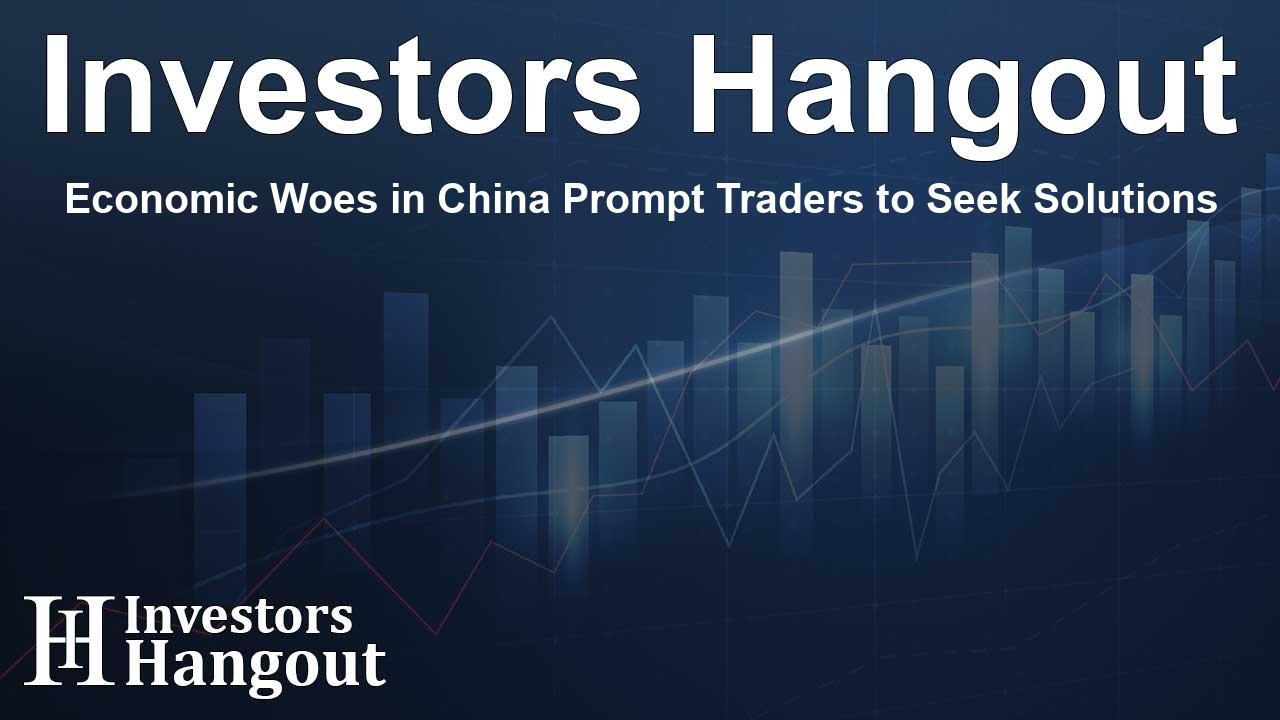Economic Woes in China Prompt Traders to Seek Solutions

Traders React to Economic Signs from China
Recent economic signals emanating from China have left equity traders in a state of heightened concern regarding the nation's financial stability. Economic figures released revealed that factory output, consumption, and investment within the country fell short of forecast expectations, contributing to an increasingly pessimistic outlook.
Concerning Economic Data
Data indicating a slowdown in key economic markers has ignited worries among investors. Jobless figures rose to their highest point in six months, with home prices continuing their downward trend. Gary Dugan, the chief executive officer of the Global CIO Office, expressed fears that the Chinese authorities are struggling to regain control over the economy.
Dugan commented, “The fear is that authorities are losing control of the economy and they won’t admit it,” highlighting the markets' potential move towards drastically lower levels without substantial policy intervention. Concerns regarding China's economic responsiveness have created a ripple effect, unsettling traders in both domestic and international markets.
Impact on Stock Indices
The anxiety regarding economic control in Beijing has directly impacted stock indices. The CSI 300 Index recently hit its lowest point since early 2019, reflecting the growing unease among investors. The Hang Seng China Enterprises Index has also faced significant declines, dropping 13% from its peak earlier in the year. As mainland financial markets close for holidays, Hong Kong remains the center of attention for investors seeking insights into the situation.
Reluctance for Fiscal Intervention
China's leaders have exhibited hesitation towards embarking on extensive fiscal stimulus plans, especially following previous actions to curb a substantial property bubble. Though support measures, including interest rate cuts and state fund purchases of exchange-traded funds, have been implemented, they have failed to adequately revive market sentiment.
A staggering $6.8 trillion has been lost in the combined market value of Chinese and Hong Kong stocks since reaching a peak in 2021, illustrating the profound repercussions of the prevailing economic environment.
Declining Economic Drivers
The latest figures underscore a weakening trend in China’s economic growth, which has mainly been reliant on exports and government enthusiasm for sector support. Notably, industrial output has expanded at a pace slower than anticipated, marking a month-to-month decline into a fourth month, the longest stretch since September 2021. Investors are increasingly feeling as though the government is not actively managing economic concerns.
Government's Recognition of Economic Challenges
In response to the market’s state of unease, the People’s Bank of China has hinted at a commitment to intensifying efforts against deflation. Additional policies aimed at reviving the economy will likely be addressed, particularly given recent credit data indicating that private consumer confidence remains tepid despite interest rates being reduced.
The Need for Entrepreneurial Support
Despite potential stimulus measures, Mark Mobius, a seasoned investor focused on emerging markets, asserted that the underlying challenges in China’s business landscape cannot be ignored. He expressed that there is a lack of entrepreneurial drive, with many business leaders cautious about investment risks. Mobius also emphasized the need for the government to ease restrictions on private enterprises to foster sustainable growth.
Conclusion
The current economic landscape in China calls for critical evaluation and action. As traders continue to analyze these developments, the hope for a turnaround hinges on decisive actions from the authorities to restore confidence and stimulate the economy. The situation remains dynamic, and all eyes will be on future government strategies in addressing these burgeoning challenges.
Frequently Asked Questions
What recent economic indicators from China have caused concern?
Recent indicators show declines in factory output, consumption, and rising unemployment rates, prompting fears of economic instability.
How are Chinese stock indices reacting to economic data?
The CSI 300 Index has reached its lowest levels since early 2019, reflecting growing investor anxiety and declining market performance.
What is the government's approach to economic stimulation?
The government has shown reluctance toward extensive fiscal stimulus, favoring cautious measures like interest rate cuts and state fund interventions.
What challenges face entrepreneurs in China today?
Many entrepreneurs are hesitant to invest due to regulatory constraints and an overall lack of confidence in the market environment.
What measures might be expected from the People’s Bank of China?
The central bank may implement further policies designed to combat deflation and restore economic vigor, focusing on boosting private consumer confidence.
About Investors Hangout
Investors Hangout is a leading online stock forum for financial discussion and learning, offering a wide range of free tools and resources. It draws in traders of all levels, who exchange market knowledge, investigate trading tactics, and keep an eye on industry developments in real time. Featuring financial articles, stock message boards, quotes, charts, company profiles, and live news updates. Through cooperative learning and a wealth of informational resources, it helps users from novices creating their first portfolios to experts honing their techniques. Join Investors Hangout today: https://investorshangout.com/
Disclaimer: The content of this article is solely for general informational purposes only; it does not represent legal, financial, or investment advice. Investors Hangout does not offer financial advice; the author is not a licensed financial advisor. Consult a qualified advisor before making any financial or investment decisions based on this article. The author's interpretation of publicly available data shapes the opinions presented here; as a result, they should not be taken as advice to purchase, sell, or hold any securities mentioned or any other investments. The author does not guarantee the accuracy, completeness, or timeliness of any material, providing it "as is." Information and market conditions may change; past performance is not indicative of future outcomes. If any of the material offered here is inaccurate, please contact us for corrections.